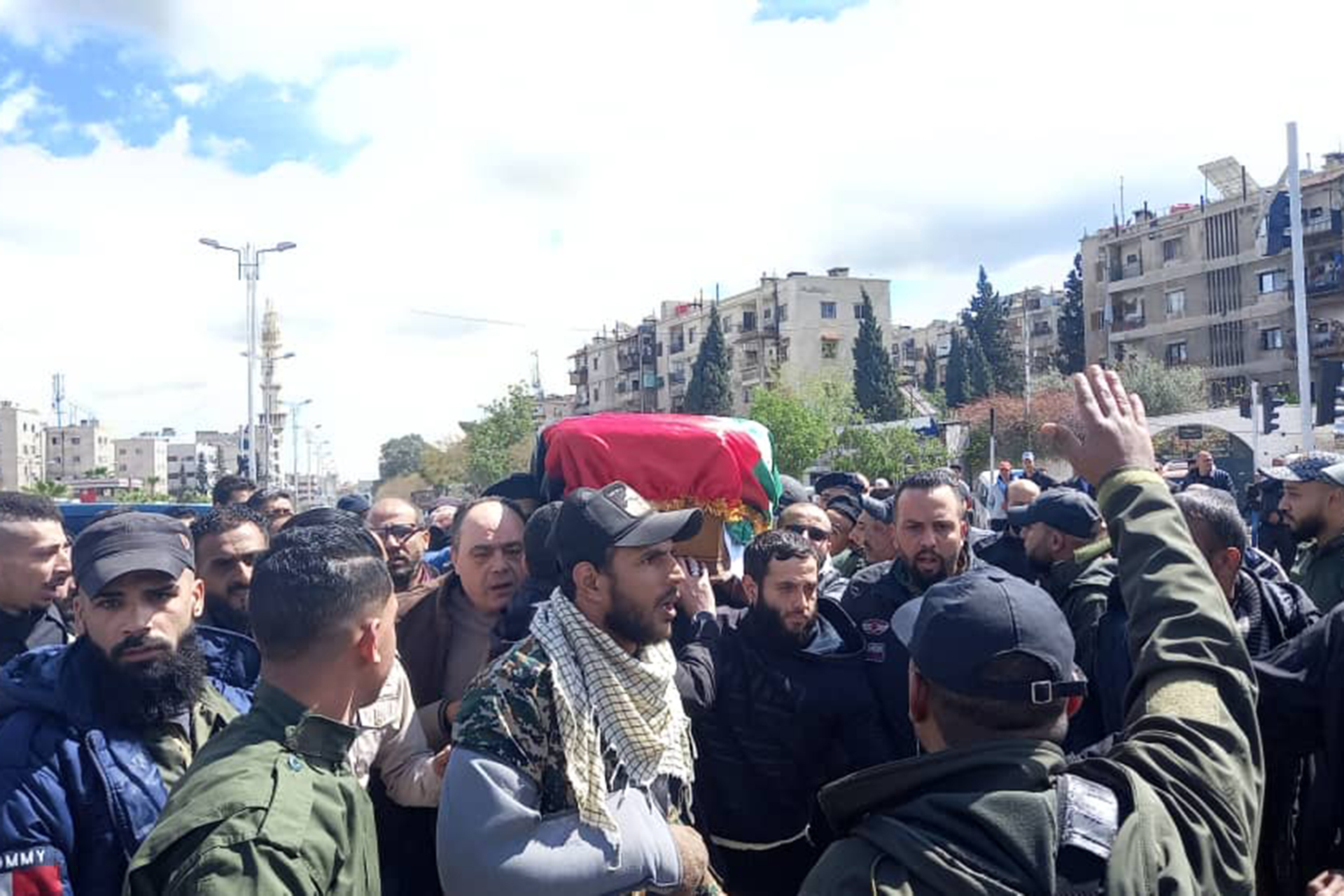Damascus / Gaza - The clock was pointing to eight in the morning on Sunday Damascus time when the Palestinian engineer Ali Ramzi Al-Aswad took a few steps outside his home in the suburb of Qudsaya in Damascus countryside, before falling bloodied, after being targeted by a hail of fire.
The official of the Islamic Jihad movement in Syria Square, Engineer Khaled Khaled, told Al Jazeera Net that more than 30 bullets from machine gun firearms used by the assassins penetrated several parts of the body of the black martyr, and took his life immediately.
The Al-Quds Brigades, the military arm of the Palestinian Islamic Jihad (PIJ), mourned the martyr engineer Ali al-Aswad, 31, and said – in a statement – that he is one of its prominent leaders in Syria, and held "the Zionist occupation responsible for this treacherous crime."
Martyr Ali Ramzi Al-Aswad (social media)
Details of the crime
The black engineer disembarked for a few steps outside his home in the suburb of Qudsaya to go to work as is his daily custom, when gunmen surprised him with more than 30 bullets, which the official Khaled says were fired from weapons that are not available or available in the Syrian arena.
Preliminary assessments, according to Khaled, indicate that "the fingerprints of the Zionist enemy are fully visible in the assassination carried out by a cell and not a single individual."
"The security system in the Islamic Jihad movement was aware about three years ago that engineer Ali, may God have mercy on him, had become an enemy target and that he was on assassination lists," Khaled said. This links his prominent role and contribution to "the development of the technical capabilities of the Jerusalem Brigades, which have emerged through its jihadi work in the Gaza Strip and the West Bank."
The black martyr had undergone advanced and multiple military training, and made great strides in training within the "Staff Command Course", which Engineer Khaled describes as one of the advanced courses in military work.
Refugee from Haifa
The martyr Ali Al-Aswad hails from the city of Haifa inside Palestine occupied in 1948, as his family sought refuge in Syria during the Nakba, and settled in the Yarmouk Palestinian refugee camp in the Syrian capital, Damascus.
His parents died a few years ago. With the outbreak of the Syrian revolution in 2011, Al-Aswad was forced to move his small family (his wife, son Abdul Rahman and two daughters) to live in a house in the suburb of Qudsaya in the Damascus countryside, which is home to about 20,<> Palestinian refugees.
Khaled praised the martyr's virtues and good qualities, and what he described as his "jihadist spirit". He said he joined Islamic Jihad early in 2005 and was keen to develop his own military capabilities.
In turn, said spokesman for the Islamic Jihad in Gaza Tariq Salmi, for Al Jazeera Net, "The martyr Ali black joined the march of jihad blessed, and walked in the knees of the resistance, and spent his time in the service of the Mujahideen and the performance of his duties, bearing in mind the liberation of Palestine and return to his land and his original city, Haifa."
Salmi stressed that the assassination will not affect the march of the Al-Quds Brigades, and will continue its work, jihad, preparation and fighting in all arenas, in defense of the holy land of Palestine, and "will not fail to support its sons successively the rise of the martyrs and the gravity of the sacrifices."
The martyr Ali Al-Aswad comes from a Palestinian family who took refuge in Syria during the Nakba and lived in Yarmouk camp in Damascus (Al-Jazeera)
Neighborhood of Martyrs
Large crowds mourned – on Monday afternoon – the martyr Ali Al-Aswad, starting from Tishreen Military Hospital in Damascus to Al-Majid Mosque in Al-Zahira area, where his body was buried after noon prayers.
Prominent leaders of Islamic Jihad's political bureau and representatives of Palestinian factions in Syria participated in the funeral procession.
The black martyr was buried near the tomb of the founder of the Islamic Jihad, the martyr Fathi Shikaki (assassinated by the Israeli Mossad in 1995 in Malta), as well as near the tomb of the late Secretary-General Ramadan Abdullah Shallah, and a few of the movement's martyrs.
Behind his assassination
Kamal Abdullah, an official in the Syrian Islamic Jihad's media committee and also close to Ali al-Aswad, said the martyr completed his primary, preparatory and secondary education at UNRWA schools in Damascus, then studied chemical engineering at Damascus University, graduating with distinction.
According to Abdullah, who spoke to Al Jazeera Net, the lions have contributed after his specialization "in the development of engineering aspects of the military capabilities of the Jerusalem Brigades, especially in the field of missiles and the development of their ranges and explosive power."
Abdullah believes that Ali al-Aswad's unique specialization and his active contribution to the development of the Saraya capabilities were likely a major motive for his assassination.
The martyr, he told his friend, established a special fund to help the poor and needy Palestinians in Syria. A few days ago, his relatives spoke of a vision in which he found himself a martyr.

